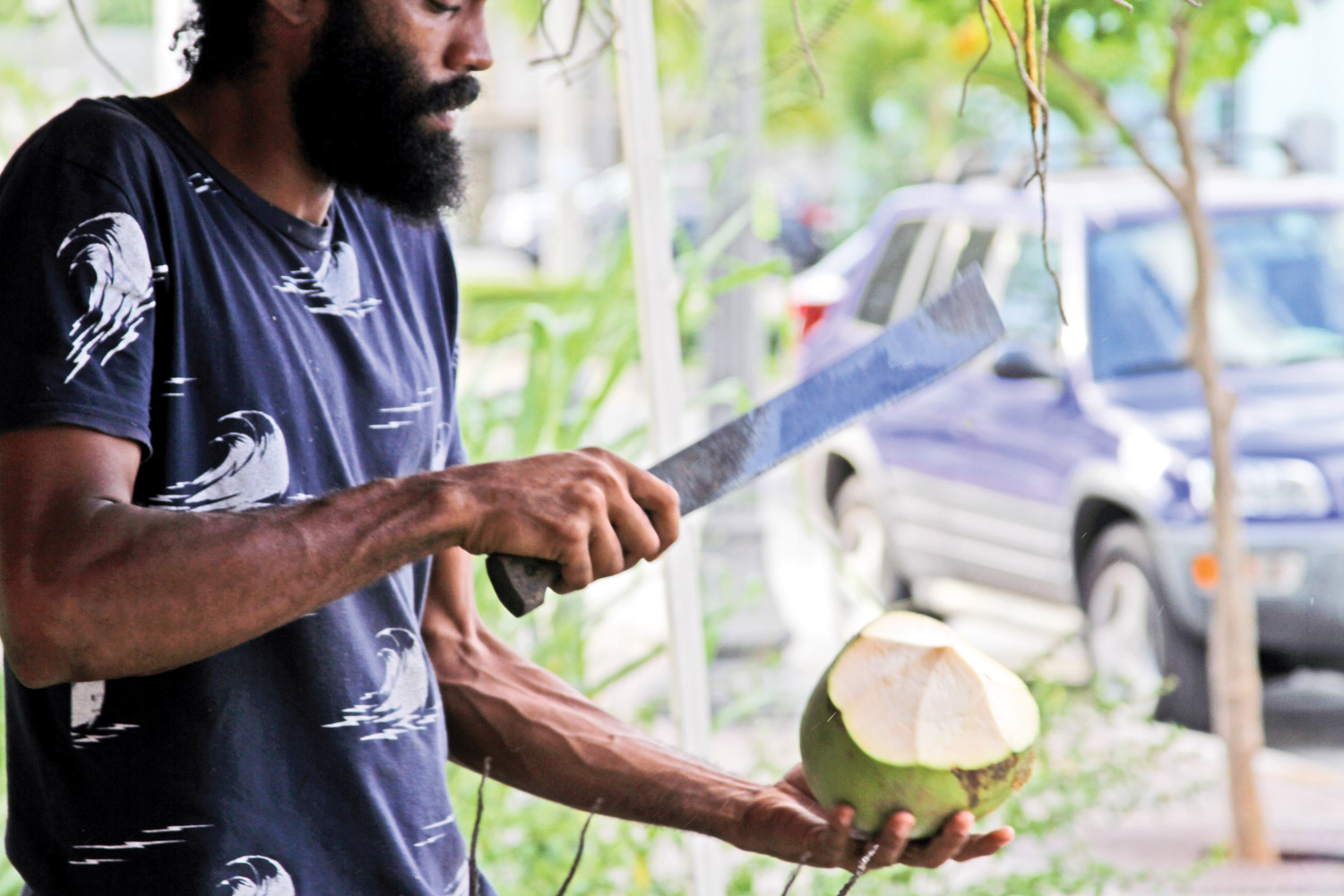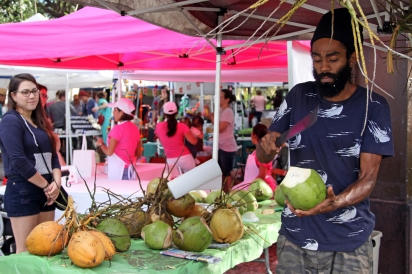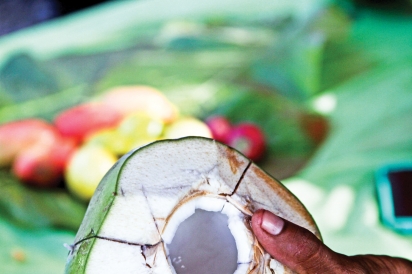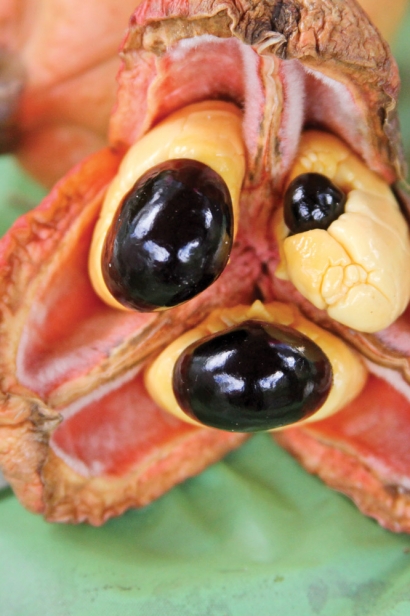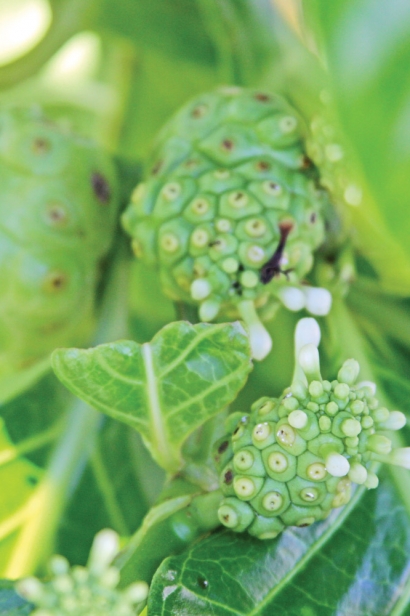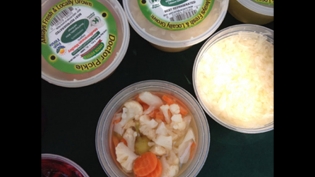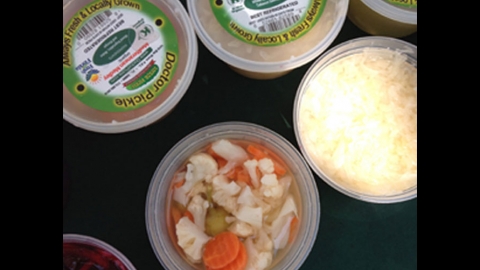Coco Man
Thwack. Chop. Fuácata! And Ras Kowin’s machete blade is slick with the juice of another freshly cracked coconut. Three deft strokes to the top and bottom of the fruit and it’s ready to stand on a table and poke a straw through. Beneath the young green or yellow husk, a tiny ocean of sweet water swirls with vital nutrients and electrolytes. Sodium, magnesium, potassium, phosphorus and lauric acid fizz slightly from the last living breath of this delicious drupe.
In war-torn countries, coconut water has been used as a plasma replacement for blood transfusions. Athletes the world over swear by its hydrating properties. Corporate beverage behemoths are cashing in to the tune of hundreds of millions of dollars a year on boxed versions. And the media frenzy surrounding the market’s explosive growth has polarized consumers regarding the reputed health benefits of drinking coconut water.
But one fact is clear: In the contiguous United States, wild, unirrigated, fruit-producing coconut palms are an anomaly, confined almost exclusively to central and South Florida. The Sunshine State is king of coco.
Every Saturday for the past five years Ras Kowin (pronounced like Ross Cohen) has set up shop at the long-running Glaser Organic Farms market on the corner of Grand Avenue and Margaret Street in Coconut Grove to sell these fresh-picked and euphorically refreshing fruits.
“Growing up I loved to cut,” he says. “I loved to cut food, to cut coconuts. Ever since I was a kid.”
Kowin hails from a little town called Point Fortin in the southwest part of Trinidad and Tobago. “I could see Venezuela from my town,” he says. “It’s a place with a lot of fruits, and a lot of cultures. There are Hindus, Muslims, Rastas, Christians and people who practice the African religions of Yoruba and Shango. There are mango, coconuts, Ethiopian apple, guava, cashew fruits, june plum, orange, grapefruit, tamarind, caimito, soursop, custard apple, Spanish lime, starfruit ...”
Kowin is a human almanac of tropical and subtropical produce as well as flowers, plants, herbs and spices, and their traditional healing uses and cultural properties. “Growing up in Trinidad, my grandma had a corner store, and every Saturday I would go with her to Point Fortin Market and get everything we needed for the week … seasoning, dasheen, yam, okra, fresh fish, fruits, vegetables.”
Today, he’s comfortable answering all questions from coconut neophytes, conversing with other local experts, and chopping and serving the freshly harvested cocos. He also makes shakes and living waters with them from his own recipes.
“I went to chef school and studied the culinary arts. I do natural juices, organic food, salads, herbal drinks and tonics. Coconut meat can be used for shakes with fruits like strawberry, banana and coconut water. It can be made into juice with kale and vegetables. Ginger circulates the nutrients through the body more rapidly. And I make a salad with spinach, tomato, thyme, green onion, lemon and coconut cream dressing. It’s very versatile.”
“I would love to share a recipe,” he says. “Take 2 cups fresh coconut water, 1 cup medium soft coco jelly, 5 cocoa beans, a 1/4 cup of raw cashew, a dash of cinnamon, and agave or honey to taste. Start with one cup of coco water, blend in the ingredients till pureed and then add the remaining cup of coconut water and you have a delicious, nutritious, fresh organic shake.”
Ras began selling coconuts in 2007 while practicing yoga with a group on Broward’s Hollywood Beach. “Then coconut water exploded and I’ve been riding the coconut wave ever since.”
While he’s glad that the drink has become so popular, he rails against its exploitation. “It’s obvious that something in a box is not as good as fresh, but big fish eat small fish and now the corporations rule the game. They’re buying coconut fields all over the world to the point where coconuts have become limited to some of the local people where they’re grown.”
Kowin’s share is all handpicked, organic, from a variety of locations, and served within a day of foraging. “Everything I get is wild. And I have access to soursop, moringa and noni fruit, too. All my cocos are mature, yet young, sweet, and with good jelly for the belly.”
Locals are ecstatic. A fit and trim regular named Phyllis says, “It’s great! I always get some to drink here and some to take home. I’ve been shopping at Glaser for like 10 years. I like going back to nature. After a workout I come right here. It’s so refreshing.”
Joanna, another return customer, admits, “I’ve seen the bottled coconut water, but I don’t buy it. It doesn’t taste the same. You cannot compare something from a box or bottle with what is fresh as nature made it.”
Meanwhile, a new devotee named Ben Leonard has been live-streaming Kowin’s booth from a phone app called Periscope. “A lot of people have never seen somebody crack open a coconut,”he says, “even where I’m from in Southern California.”
Kowin’s Rasta principles guide all of his business decisions. “The way I do coconuts is with a consciousness and awareness so as not to make my sources extinct. I only pick ones that’s ready. Never too young. We always need the tree. Cannot be greedy. I have to always be able to come back and harvest more.”
As far as he’s concerned, “It’s not all about money. You can go other places and people charge more. But I have the most fresh organic coconuts. All natural. All local. Never shipped. My coconuts are still breathing. They have life in them when you drink them. I’m just here to represent honesty and a real authentic product. No exploitation. Fair trade. I am Rasta. I deal with peace, love, clean hands, a pure heart and humbleness. This is one of the purest drinks available to mankind; filtered and created by nature.”
Find Kowin at the Glaser Organic Farms farmers market on Saturdays from 11-7 at 3300 Grand Avenue in Coconut Grove.


